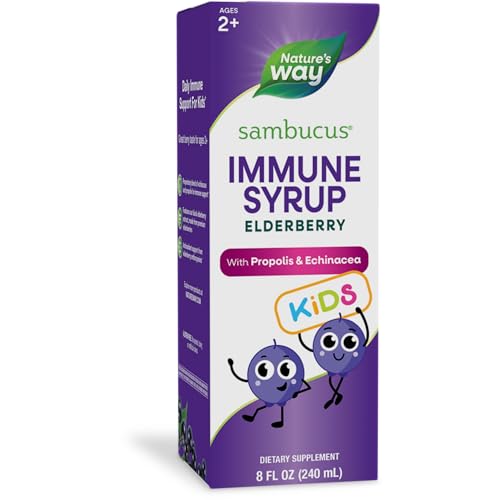

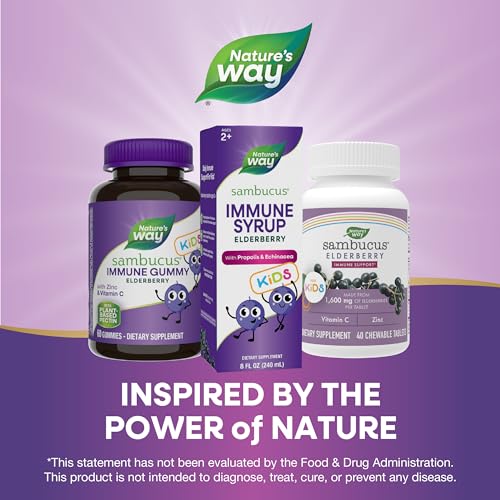

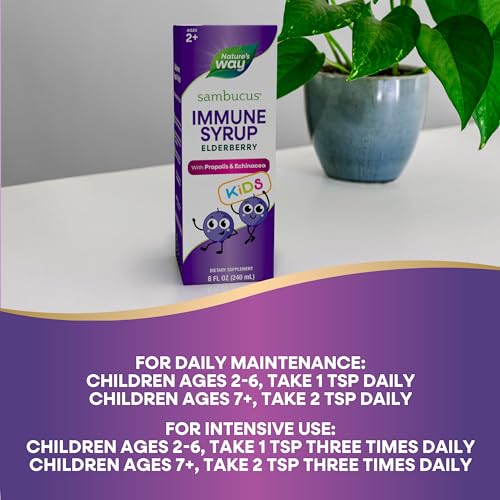
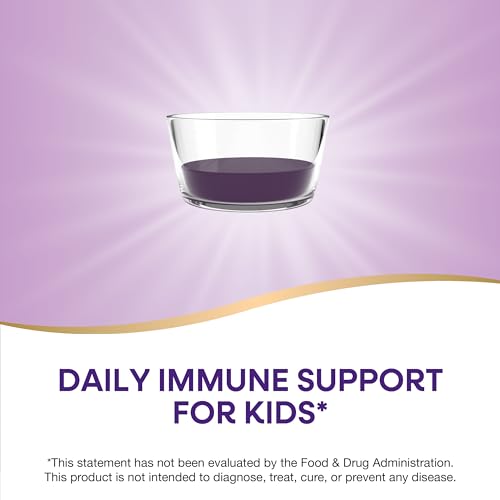

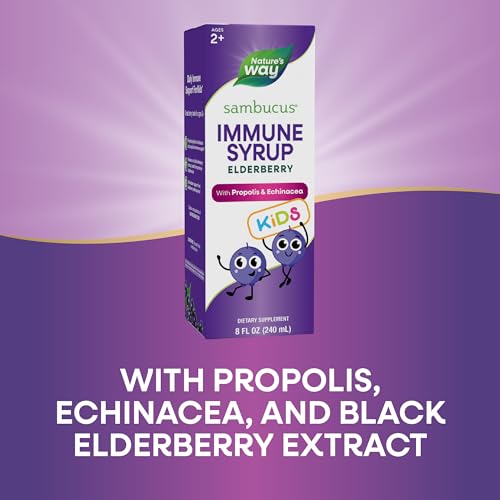
Nature's Way Elderberry Immune Syrup for Kids - Antioxidant Support, Vegetarian - 8 Fl Oz


Malic Acid
High RiskMalic acid is a naturally occurring organic acid found in various fruits, particularly apples. It plays a role in the metabolic processes of living organisms and is commonly used as a flavoring agent, pH regulator, and preservative in food and cosmetic products.
Sustai Insights
Malic acid serves as an effective pH adjuster and flavor enhancer, contributing to the sensory profile of products. However, it may cause skin and eye irritation and has high use restrictions, limiting its application. Regulatory bodies have noted these concerns, leading to restrictions on its use in certain products. Overall, the ingredient is considered high risk due to these factors, necessitating careful usage and consideration of safer alternatives.
Potassium Sorbate
Medium RiskPotassium sorbate is a potassium salt of sorbic acid, primarily used as a preservative in food and cosmetic products. It inhibits the growth of molds, yeast, and some bacteria, extending the shelf life of products. It is commonly found in various formulations due to its effectiveness and low toxicity.
Sustai Insights
Potassium sorbate serves as an effective preservative, preventing microbial growth in food and cosmetic products, which is vital for safety and longevity. Although it has a low risk of carcinogenicity and developmental toxicity, there is a moderate concern regarding allergies and immunotoxicity. Environmentally, it poses minimal risks as it is not significantly bioaccumulative. Regulatory agencies have verified its use, although some products may face restrictions. Overall, it is assessed as a medium risk ingredient, with safe usage practices recommended, and alternatives such as natural preservatives could be considered.
Fructose
Low RiskFructose is a simple sugar naturally found in fruits and honey. It is a type of carbohydrate that is commonly used as a sweetener in food products. Fructose can be absorbed directly into the bloodstream and is metabolized primarily in the liver.
Sustai Insights
Fructose serves as a sweetening agent and is valued for its high sweetness intensity. It is generally recognized as safe, with low concerns regarding carcinogenicity, allergies, or developmental toxicity. However, excessive consumption may lead to metabolic issues. Environmentally, fructose is biodegradable and poses low pollution risk. Regulatory bodies like the FDA have no significant restrictions on its use, indicating an overall low risk associated with typical consumption levels. Safe usage involves moderation in diet, and while alternatives like stevia exist, fructose remains widely accepted.
Propolis
Low RiskPropolis is a resinous substance produced by bees from plant materials, primarily used in cosmetic and medicinal products for its potential antimicrobial properties. It acts as a natural preservative and may contribute to product stability.
Sustai Insights
Propolis offers functional benefits such as antimicrobial properties and potential skin protection. It is sustainably sourced and biodegradable. Health risks are minimal, with low concerns for carcinogenicity, allergies, or reproductive toxicity. Environmentally, it poses low pollution or bioaccumulation risks. Regulatory status shows no current restrictions. Overall, propolis is assessed as low risk, with safe usage practices recommended. Alternatives include other natural preservatives like rosemary extract.
Vegetarian Glycerin
Low RiskVegetarian glycerin, also known as glycerol, is a colorless, odorless, and viscous liquid derived from plant sources. It is primarily used as a humectant, solvent, and emollient in various personal care products, helping to retain moisture and improve texture.
Sustai Insights
Vegetarian glycerin offers functional benefits as an effective humectant, promoting hydration and skin smoothness. It is biodegradable and typically sustainably sourced. Health risks associated with glycerin are low, with no significant concerns for carcinogenicity, allergens, or reproductive toxicity. Environmental risks are minimal, and it is not subject to major regulatory warnings. Overall, the risk level for this ingredient is low, making it a safe choice in formulations. Safe usage practices include ensuring proper concentrations in products, and alternatives such as propylene glycol exist but may have differing properties.
Fructose
Low RiskFructose is a simple sugar naturally found in fruits and honey. It is a type of carbohydrate that is commonly used as a sweetener in food products. Fructose can be absorbed directly into the bloodstream and is metabolized primarily in the liver.
Sustai Insights
Fructose serves as a sweetening agent and is valued for its high sweetness intensity. It is generally recognized as safe, with low concerns regarding carcinogenicity, allergies, or developmental toxicity. However, excessive consumption may lead to metabolic issues. Environmentally, fructose is biodegradable and poses low pollution risk. Regulatory bodies like the FDA have no significant restrictions on its use, indicating an overall low risk associated with typical consumption levels. Safe usage involves moderation in diet, and while alternatives like stevia exist, fructose remains widely accepted.
Propolis
Low RiskPropolis is a resinous substance produced by bees from plant materials, primarily used in cosmetic and medicinal products for its potential antimicrobial properties. It acts as a natural preservative and may contribute to product stability.
Sustai Insights
Propolis offers functional benefits such as antimicrobial properties and potential skin protection. It is sustainably sourced and biodegradable. Health risks are minimal, with low concerns for carcinogenicity, allergies, or reproductive toxicity. Environmentally, it poses low pollution or bioaccumulation risks. Regulatory status shows no current restrictions. Overall, propolis is assessed as low risk, with safe usage practices recommended. Alternatives include other natural preservatives like rosemary extract.
Potassium Sorbate
Medium RiskPotassium sorbate is a potassium salt of sorbic acid, primarily used as a preservative in food and cosmetic products. It inhibits the growth of molds, yeast, and some bacteria, extending the shelf life of products. It is commonly found in various formulations due to its effectiveness and low toxicity.
Sustai Insights
Potassium sorbate serves as an effective preservative, preventing microbial growth in food and cosmetic products, which is vital for safety and longevity. Although it has a low risk of carcinogenicity and developmental toxicity, there is a moderate concern regarding allergies and immunotoxicity. Environmentally, it poses minimal risks as it is not significantly bioaccumulative. Regulatory agencies have verified its use, although some products may face restrictions. Overall, it is assessed as a medium risk ingredient, with safe usage practices recommended, and alternatives such as natural preservatives could be considered.
Malic Acid
High RiskMalic acid is a naturally occurring organic acid found in various fruits, particularly apples. It plays a role in the metabolic processes of living organisms and is commonly used as a flavoring agent, pH regulator, and preservative in food and cosmetic products.
Sustai Insights
Malic acid serves as an effective pH adjuster and flavor enhancer, contributing to the sensory profile of products. However, it may cause skin and eye irritation and has high use restrictions, limiting its application. Regulatory bodies have noted these concerns, leading to restrictions on its use in certain products. Overall, the ingredient is considered high risk due to these factors, necessitating careful usage and consideration of safer alternatives.
Vegetarian Glycerin
Low RiskVegetarian glycerin, also known as glycerol, is a colorless, odorless, and viscous liquid derived from plant sources. It is primarily used as a humectant, solvent, and emollient in various personal care products, helping to retain moisture and improve texture.
Sustai Insights
Vegetarian glycerin offers functional benefits as an effective humectant, promoting hydration and skin smoothness. It is biodegradable and typically sustainably sourced. Health risks associated with glycerin are low, with no significant concerns for carcinogenicity, allergens, or reproductive toxicity. Environmental risks are minimal, and it is not subject to major regulatory warnings. Overall, the risk level for this ingredient is low, making it a safe choice in formulations. Safe usage practices include ensuring proper concentrations in products, and alternatives such as propylene glycol exist but may have differing properties.
Discover Nature's Way Sambucus Elderberry Immune Syrup, specially formulated for children ages 2 and up. This delicious berry-flavored syrup combines the power of echinacea and propolis to support your child's immune health, ensuring they stay vibrant and active all year round.
- Immune Support: Packed with a proprietary blend of echinacea and propolis, this syrup is designed to promote robust immune function in growing children.
- Antioxidant Benefits: Enriched with black elderberry extract, which contains anthocyanins that help neutralize free radicals, offering natural antioxidant support for your child's overall wellness.
- Easy Daily Use: Simple dosing instructions make it easy for kids to take their daily immune support, promoting a consistent health routine.
- Safe and Natural Ingredients: Gluten-free, vegetarian, and free from artificial colors, this syrup is made with high-quality ingredients you can trust.
- Community Commitment: Nature’s Way has over 50 years of experience in harnessing nature for wellness, ensuring each product reflects their dedication to health and sustainability.
Subscribe & Save with Sustai
- Best Price Guarantee: Always enjoy the lowest prices on sustainable home essentials.
- No Surprises: We’ll notify you before shipping. No hidden fees, ever.
- You’re in Charge: Change, pause, or cancel your subscription anytime with ease.
- Eco-Friendly Deliveries: Our grouped shipments mean less packaging and lower emissions.
Join us on a sustainable journey. Special offers for a limited time! Prices and promotions may change.
Recommended Products
Discover Nature's Way Sambucus Elderberry Immune Syrup, specially formulated for children ages 2 and up. This delicious berry-flavored syrup combines the power of echinacea and propolis to support your child's immune health, ensuring they stay vibrant and active all year round.
- Immune Support: Packed with a proprietary blend of echinacea and propolis, this syrup is designed to promote robust immune function in growing children.
- Antioxidant Benefits: Enriched with black elderberry extract, which contains anthocyanins that help neutralize free radicals, offering natural antioxidant support for your child's overall wellness.
- Easy Daily Use: Simple dosing instructions make it easy for kids to take their daily immune support, promoting a consistent health routine.
- Safe and Natural Ingredients: Gluten-free, vegetarian, and free from artificial colors, this syrup is made with high-quality ingredients you can trust.
- Community Commitment: Nature’s Way has over 50 years of experience in harnessing nature for wellness, ensuring each product reflects their dedication to health and sustainability.

You can have at most 2 Sustainable Steals products in your cart
Customer Reviews
Customers’ View
Customers appreciate the taste and effectiveness of the Elderberry Syrup, noting its pleasant sweetness and the absence of artificial flavors. Many highlight its role in supporting immune health, with testimonials indicating that it helps reduce the duration and severity of illnesses in children. The syrup is recognized for its easy dosage, making it convenient for daily use, and is deemed safe for kids due to its natural ingredients and absence of harmful additives. However, some customers express mixed feelings about its value for money and the duration of supply. Overall, the product aligns well with health-conscious values, offering a trusted option for daily immune support.
AI-generated from the text of customer reviewsThis product is rated 4.8 of 5.0 stars.
It has received 10 reviews.





